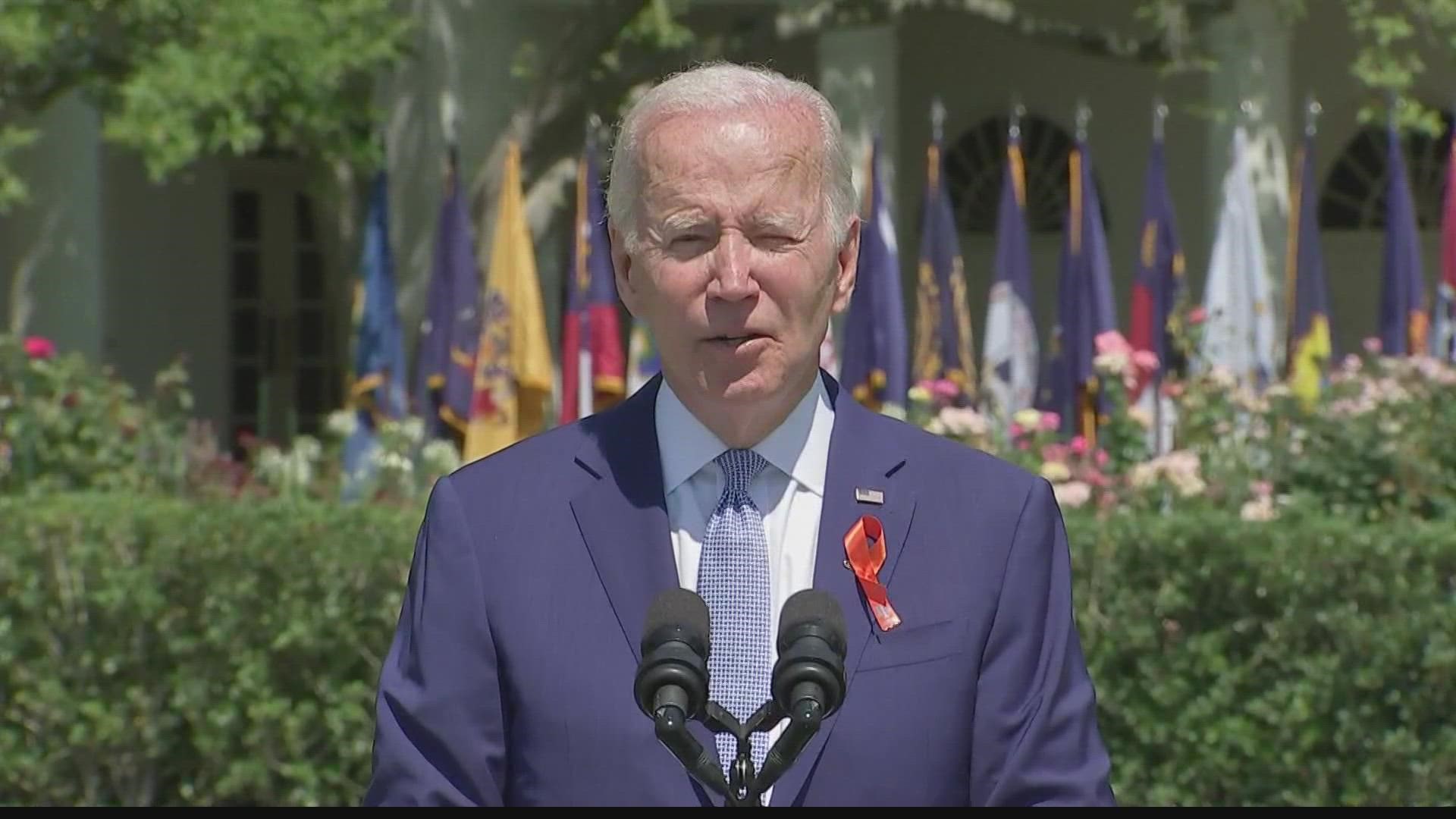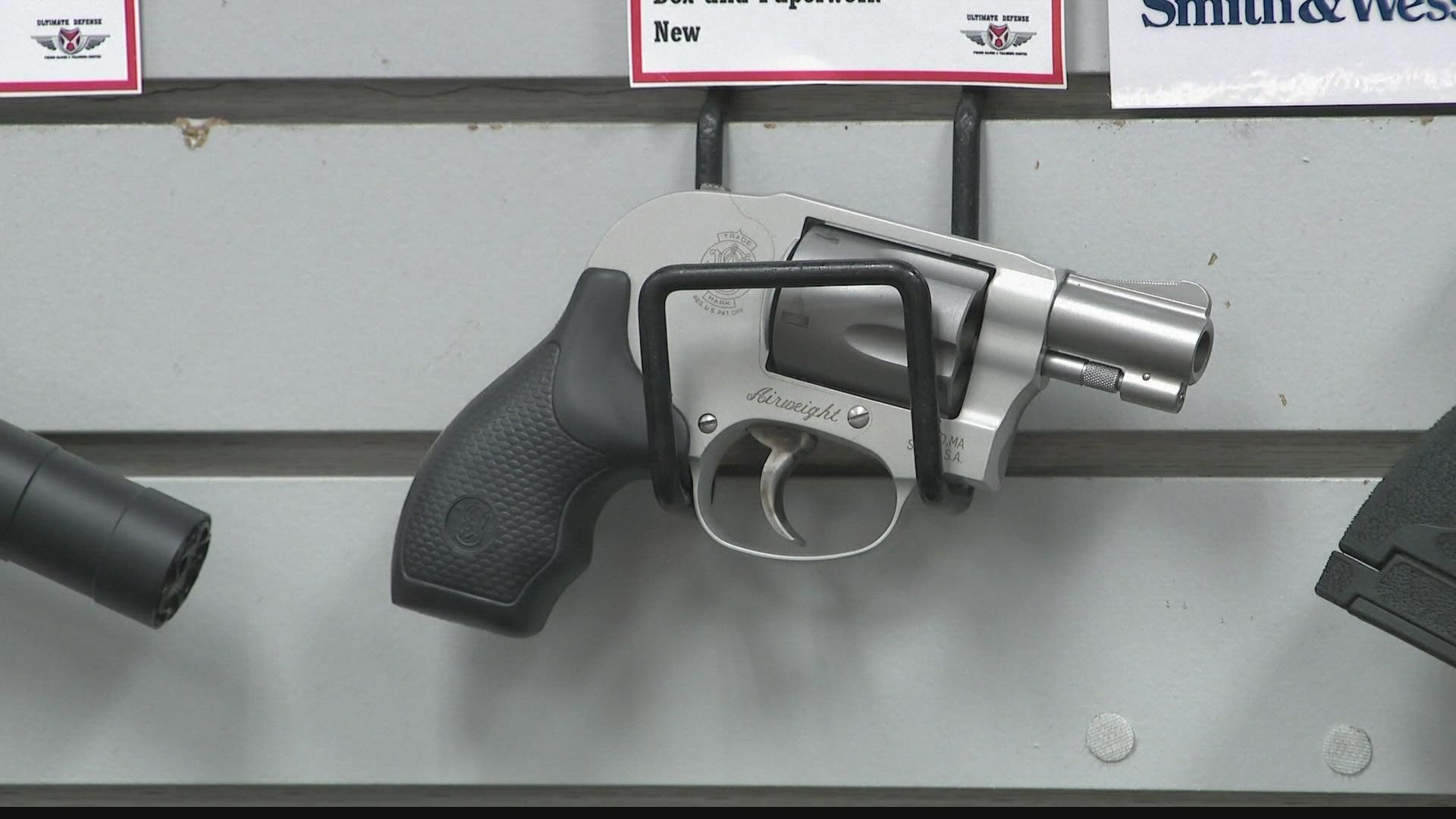ST. LOUIS, Missouri —
While mourners held a moment of silence Monday morning at the site of last week's July Fourth mass shooting in Highland Park, President Joe Biden appeared before a large crowed gathered on the White House lawn to highlight a new $13 billion federal gun safety package he signed into law two weeks ago.
"Will we match thoughts and prayers with action? I say yes," Biden said. "That's what today is about."
The Monday morning press event also provided the White House a second chance to promote the president's ability to navigate the partisan obstacles on Capitol Hill to reach bipartisan agreement on a difficult and often divisive topic.
Biden's rollout came on the same day the New York Times published new poll numbers showing his support waning across the country and within his own party.
Nearly eight in ten Americans think the country is on the wrong track, and nearly two in three Democrats want someone else to run for president in 2024, according to the New York Times/Siena College survey.
Missouri's senior Senator Roy Blunt played a major role in delivering President Biden that rare moment, a bipartisan win that offers some evidence the Senate can still produce results in a bitterly partisan political climate. Blunt was one of several Senate Republicans who hammered out the framework of the deal, and stayed at the table when talks turned sour.
In doing so, Blunt helped craft the country's first major gun law in the 21st century.
The new federal gun law closes the so-called 'boyfriend loophole,' which allows dating partners and domestic violence cases to buy a gun. It also includes incentives for states to implement red flag laws, more penalties for gun traffickers, enhanced background checks for younger gun buyers, and more funding for mental healthcare.
Senate Minority Leader Mitch McConnell (R-Kentucky) called the compromise an agreement that advances "common-sense solutions without rolling back rights."
Still, signs of discontent disrupted Biden's press conference. A father who buried his son after the Parkland school shooting shouted, "You have to do more."
After White House staff escorted the man out, the President ultimately agreed with his sentiment that the bipartisan agreement didn't go far enough.
"Assault weapons need to be banned," Biden said. "They were banned. I led the fight in 1994."
"I'm determined to ban these weapons again, and high capacity magazines that hold 30 rounds and allow mass shooters fire hundreds of bullets in a matter of minutes," Biden said.
Governor J.B. Pritzker (D-Illinois) joined Biden's calls for banning assault weapons and high capacity magazines, arguing "weapons of combat" fire ammunition that can "rip through Kevlar" and put police in greater danger.
Mayor Tishaura Jones (D-St. Louis) echoed Biden's calls for stricter gun laws, saying, "assault weapons have no place on our streets."
"In most of the mass shootings, it's been assault weapons that have killed hundreds of people," she said.
Jones also celebrated the hundreds of millions of dollars in federal funding available in this law. She hopes to use to build on new programs, "like our successful cops and clinicians and 911 diversion programs to take the burden off of our police officers."
The mayor wants City Hall to use some of that money to reconfigure which 911 calls require a police officer, and which calls require a mental health worker.
"We have to make sure that we're doing what we can on the ground to deploy the right resource to the right call," she said.
Jones' administration points to an analysis from MasterCard that shows the 'Cops and Clinicians' program "saved the police department and EMS more than 2,000 work hours to help them respond to other priorities, saving the city an estimated $2.2 million in 2021," according to a spokesman.
The new program, initially funded with federal pandemic relief funds, could expand with new mental health funding provided in the bipartisan package.
While Blunt, a conservative Republican, showed little interest in taking a victory lap in front of television cameras, Jones, a progressive Democrat, praised his push for mental health funding behind the scenes. Jones said Blunt's work could have the effect of lightening the workload for police officers in St. Louis.
"Keeping our children and family safe should be a bipartisan issue. But sadly, that's in short supply nowadays. That's why I am so happy to see Senator Roy Blunt provide a critical vote to get this legislation across the finish line," Jones said during a virtual video conference Monday morning.
"Senator Blunt, who I count as a friend for many, many years, is passionate about mental health, and that's one one of the reasons that brought his vote along for this particular bill," Jones said.
Republicans adopted a state law, the Second Amendment Preservation Act, which attempts to block federal gun regulations from taking effect in Missouri.
Attorney General Eric Schmitt's office did not respond to questions asking whether that state law might interfere with expanded background checks in the new federal law.
Jones, whose administration has signed onto a lawsuit challenging the state's gun law ban, argued it was unconstitutional.
"There's this tiny thing called the Supremacy Clause that says that federal law trumps state law," she said.
Jones described the GOP ban on gun laws as law enforcements' "greatest challenge" in removing illegal guns from the streets.
"They have relaxed our gun laws to the point where, locally, we can not have any common-sense gun safety laws," she said. "So that ties our hands in terms of removing guns from our streets."


